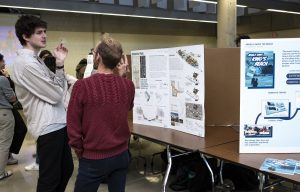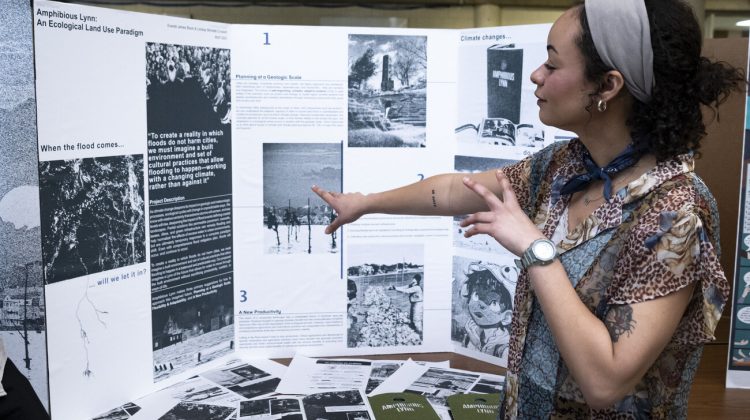LYNN — Harvard’s first-year Master of Urban Planning students showcased their semester-long research projects focused on improving the city at Breed Middle School. This year, the class they took was called Climate Ready Lynn.
“We usually work with a real climate, a real place, and a real problem. And so, this is the second year we’ve been working in Lynn, and this year we’re looking at climate adaptations,” Daniel D’Oca, an associate professor in practice of urban planning at the Harvard Graduate School of Design, said.
The first year the MUP students worked in Lynn, they focused on how the city could embrace its status as a gateway city and be a better environment for immigrants and refugees.

D’Oca said this year, the class focused on preparing Lynn for the impacts of climate change.
“We’re looking at how heat or wildfires or invasive species or coastal erosion or storms, how these things are likely to get worse,” D’Oca said. “We’re thinking about what can Lynn do to help prepare for the future.”
D’Oca said the 47 students worked in groups or individually to focus on different climate hazards, with the project split up into three assignments.
The first assignment was to create a public service announcement to help residents “understand and make decisions about how Lynn might adapt to climate change.” The students used the PSAs to gather community input and research regarding climate hazards that occur in the city.
“After we did the research, we all worked together to identify some recommendations for each of those hazards,” D’Oca said. “So, how do you combat extreme heat? Create cooling corridors or create urban greenways. How do you deal with inland flooding? Turn hard surfaces into permeable surfaces.”
The main aspect of the second assignment was to create a framework plan offering a “citywide vision” for what Lynn can do to combat climate hazards. The main deliverable of this assignment was a map of Lynn, showing the project’s strategy and goals.
The last assignment was to take one of the ideas from the framework plan and develop it into an actual physical proposal, policy recommendation, or another approach deemed fit.
MUP student Melissa Berlin talked about her project, Future Proof: an Inclusive Climate Framework.
Berlin said she focused on age-friendly planning and previously worked with Boston on its Age-Friendly Boston Action Plan.
According to Boston’s website, age-friendly planning is when a city adapts its structures and services to be accessible and inclusive to residents of all ages and abilities.
Berlin said she also has a strong interest in climate resilience planning.
“I found that they (the two planning methods) tend to conflict with each other,” Berlin said.
She gave an example of a cherry tree, which tends to have roots that stick out. This causes the roots to take over walkways in what Berlin called “sidewalk heaving” and described as an “accessibility nightmare.”
Berlin said at that point, an accessibility advocate or planner might suggest getting rid of the tree, while a climate advocate would argue for the tree to stay.
“So, the idea (of my project) is that you have a future-proof resilience planning task force. So you have all these representatives on a team, and you’re kind of running ideas by each other and getting input on different goals so that you can work together and come up with a proposal that has co-benefits rather than conflicts,” Berlin said.
One possible solution, she said, was Flexi-pave, a “rubbery pavement” material that can be put over the roots and stays smooth, bending with the tree as it grows.
“Or, you can sort of pave above and around the tree, because the last thing you want to do is cut down a mature cherry tree and lose that canopy,” Berlin said.
D’Oca said first-year MUP students will be coming back to Lynn next year, but he is not yet sure what their projects will focus on.

